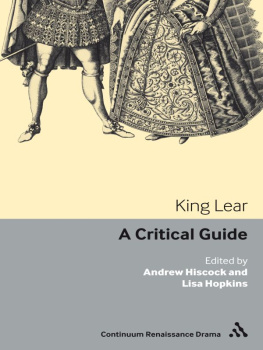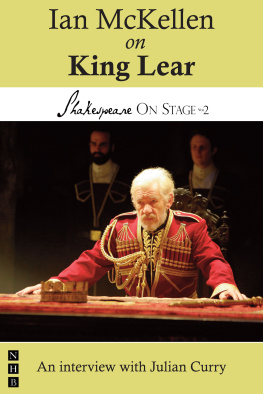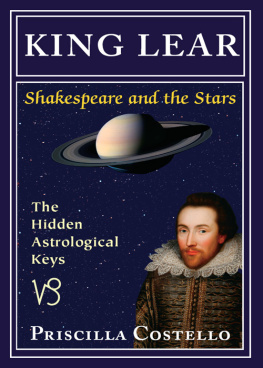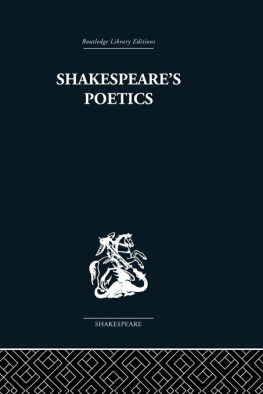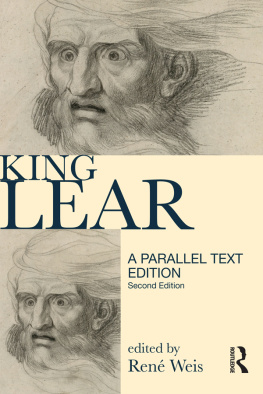King Lear
Continuum Renaissance Drama
Series Editors: Andrew Hiscock, University of Wales Bangor, UK and Lisa Hopkins, Sheffield Hallam University, UK
Continuum Renaissance Drama offers practical and accessible introductions to the critical and performative contexts of key Elizabethan and Jacobean plays. Each guide introduces the texts critical and performance history but also provides students with an invaluable insight into the landscape of current scholarly research through a keynote essay on the state of the art and newly commissioned essays of fresh research from different critical perspectives.
1 Henry IV: A Critical Guide, ed. Stephen Longstaffe
A Midsummer Nights Dream: A Critical Guide, ed. Regina Buccola
Doctor Faustus: A Critical Guide, ed. Sara Munson Deats
Duchess of Malfi: A Critical Guide, ed. Christina Luckyj
The Jew of Malta: A Critical Guide, ed. Robert A. Logan
Tis Pity Shes A Whore: A Critical Guide, ed. Lisa Hopkins
Volpone: A Critical Guide, ed. Matthew Steggle
Women Beware Women: A Critical Guide, ed. Andrew Hiscock
KING LEAR
A Critical Guide
Edited by Andrew Hiscock
and
Lisa Hopkins

Continuum International Publishing Group
The Tower Building, 11 York Road, London SE1 7NX
80 Maiden Lane, Suite 704, New York, NY 10038
www.continuumbooks.com
Andrew Hiscock, Lisa Hopkins and contributors 2011
All rights reserved. No part of this publication may be reproduced or transmitted in any form or by any means, electronic or mechanical, including photocopying, recording, or any information storage or retrieval system, without prior permission in writing from the publishers.
British Library Cataloguing-in-Publication Data
A catalogue record for this book is available from the British Library.
ISBN: 978-1-4411-5601-3
Library of Congress Cataloguing-in-Publication Data
A catalog record for this book is available from the Library of Congress.
Contents
Ren Weis
Joan Fitzpatrick
Ramona Wray
Philippa Kelly
Lori Anne Ferrell
Anthony Parr
John J. Norton
Willy Maley
Peter Sillitoe
Series Introduction
The drama of Shakespeare and his contemporaries has remained at the very heart of English curricula internationally and the pedagogic needs surrounding this body of literature have grown increasingly complex as more sophisticated resources become available to scholars, tutors and students. This series aims to offer a clear picture of the critical and performative contexts of a range of chosen texts. In addition, each volume furnishes readers with invaluable insights into the landscape of current scholarly research as well as including new pieces of research by leading critics.
This series is designed to respond to the clearly identified needs of scholars, tutors and students for volumes which will bridge the gap between accounts of previous critical developments and performance history and an acquaintance with new research initiatives related to the chosen plays. Thus, our ambition is to offer innovative and challenging Guides which will provide practical, accessible and thought-provoking analyses of Renaissance drama. Each volume is organised according to a progressive reading strategy involving introductory discussion, critical review and cutting-edge scholarly debate. It has been an enormous pleasure to work with so many dedicated scholars of Renaissance drama and we are sure that this series will encourage to you read 400-year old playtexts with fresh eyes.
Andrew Hiscock and Lisa Hopkins
Preface
King Lear has seen some dramatic changes in its critical fortunes since it was first composed circa 16056. In preparing a tragedy for the stage, Shakespeare took not one but two stories which were already familiar to his audience. The first concerned the pseudo-historical King Leir, mentioned in Geoffrey of Monmouths History of the Kings of Britain, whose story would have been familiar to Shakespeares audience because it had recently been retold in the anonymous play The Chronicle History of King Leir. The second was related in Sir Philip Sidneys epic (and unfinished) romance The Countess of Pembrokes Arcadia as the story of the blind king of Paphlagonia and his two sons: one good and loyal, like Edgar; the other ambitious and treacherous, like Edmund. Shakespeare would make significant changes to the original narratives themselves but, in bringing them together, he also forced the narratives to speak to each other, just as the main plot and the sub-plot of the play mirror and cast light upon each other.
Recent scholarship has continued to be exercised by the complex relationship between Shakespeares tragic narratives and his sources, and indeed between the differing versions of the play which have survived into the modern period in the shape of the Quarto and Folio versions published during the Jacobean period. Time and space now have to be made for these thorny issues, alongside more abiding interests in the Shakespearean dramatizations of: temporal power and social order; multifarious human investments in cosmology, theology and morality; the status and functions of the nation and political violence; and the performance and reception of this celebrated tragedy down the centuries, across continents and via increasingly diverse media. This volume is designed to extend reader interest in all of these areas, and to establish newer angles of vision on the tragedy by raising questions about seventeenth-century Britishness, early modern understandings of landscape, the changing interpretations of self-murder in this period and the implications of the insatiable appetite for Shakespearean adaptation.
The 1608 text of the play describes itself as a history and in the 1623 text we are presented with a tragedy: indeed, it is because of the continuing and vigorous editorial debates surrounding the relationships between, and the integrity of, these two different texts that the contributors to this volume have of necessity made choices from the variety of modern editions of King Lear in their own analyses which follow. Ren Weiss introduction maps out the reception of the play from 1606 to the present day, ranging widely across engagements with it over the centuries in the forms of editions, performances, critical debates and adaptations, and he focuses particularly on the long struggle of critics and audiences alike to come to terms with the chaos and apparent nihilism which has so often been perceived as lying at the very heart of this tragedy. In the chapter devoted to the Critical Backstory, Joan Fitzpatrick reviews in detail the reception of King Lear by attending to the seventeenth-century desire to shine a light on the tragedys faults and to amend it through refining its (perceived) narrative excesses and its distressing dnouement. The development of King Lear as a reading, rather than a theatrical, experience is considered, as well as the manner in which the tragedy has responded to critical appetites for psychological interest and the interrogation of early modern social theories. With regard to the contemporary period, Fitzpatrick demonstrates how

